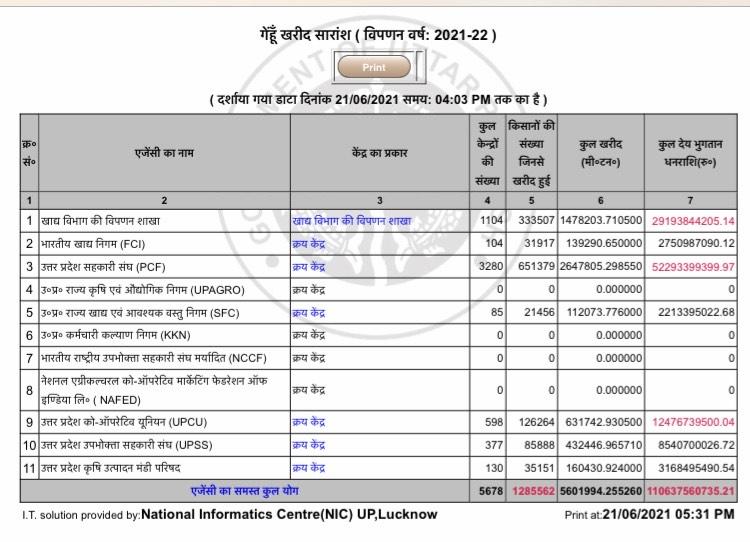After Yogi's Tall Claims on Guaranteed Wheat Procurement, Only 14 % Procured So Far in UP
Lucknow: Even as Uttar Pradesh Chief Minister Yogi Adityanath claims to purchase wheat as long as farmers are interested in selling their produce, peasants in several districts in the state staged protests alleging that they were unable to sell their grains as the government procurement centres have not been opening since the last two months due to the pandemic.
Hundred of farmers in Gonda and Ballia districts have been protesting for the last three days due to the non-procurement of wheat at purchasing centres for the past one month. The farmers have been protesting against arbitrariness of those in charge of the warehouses, because of which the farmers' wheat has not been procured at the centres.
"Most of the farmers have not been able to sell their wheat due to the COVID-19 lockdown. Now, on the instructions of the government, the district magistrate has closed all the procurement centre in the state ahead of time. The officers are reluctant in purchasing wheat from farmers at the purchasing centres. Besides, the warehouse in-charge bought wheat from middlemen arbitrarily," Ravikant, a farmer from Gonda told Newsclick, adding that the slow pace of procurement is forcing them to sell crop at below Minimum Support Price (MSP) in mandis. The MSP for wheat is fixed at Rs 1,975 per quintal, up from Rs 1,925 last year.
He further said that It has been raining incessantly in many parts of the state, and thus, there is a high chance of wheat rotting due to moisture. In this situation, the farmers would be forced to sell their produce at throwaway prices.
Narendra Chaudhary, a farmer, who grows wheat in Mawana village of Meerut district, told Newsclick, “The pace of procurement is slow and the officials are ignoring the purchase in the name of quality. Due to the delay, I had to sell 60 quintals of wheat to a trader at a rate of Rs 1,850 per quintal because I cannot leave my wheat to be rotting in the rainy season," he said, adding that many farmers in Meerut and adjacent districts were selling wheat in mandis at Rs 1,850-1,890 per quintal, below the MSP, to save transportation costs and labour charges.
When asked about the reason behind selling below the MSP, he said, "Since most of the purchasing centres are either closed or there are never ending queues outside, we have to bring it back again in tractors, which increases double the transportation cost, plus labour charges. Therefore, we have been forced to sell wheat to local traders at lower than MSP," he claimed.
A shortage of cash over the last one year has greatly hurt the agriculture sector. Rural areas are the worst affected and farmers have not been paid in full for their produce despite bumper crop this year.

According to data collected by the UP government’s Food and Civil Supplies Department, 56 lakh metric tonnes (LMT) of wheat had been procured from 12.85 lakh farmers at 5,678 procurement centres in total, run by seven different procurement agencies across the state till June 21, total government purchase is just 14.3% of the total estimated production this year, which is 391.46 LMT.
As per data, the figure for the corresponding period in the procurement season 2020-21 was 35.7 LMT, which was just 9.2% of the total production of 390 LMT, whereas the target of procurement by the government was 55 LMT. Similarly, in 2019-20, UP had the same target — 55 LMT — but procured 37 LMT, only 9.7% of the total estimated production of 380 LMT. The Yogi government had not achieved its procurement target in both years.
The government data suggest that till June 21, wheat has been procured from a total of 12.8 lakh farmers in the entire state, whereas 16.10 lakh farmers in the state had applied for registration to sell wheat.
Agrarian experts, as well as farmers, claim that this year the amount of procurement is quite marginal and less; it will hurt the farmers as they are forced to sell their produce at throwaway prices. The farmers say that the state government has set no target of procurement of wheat this year, fearing a backlash from farmers, who are agitating against three contentious farm laws at Delhi borders.
"In four years of his tenure, the Yogi government in the state has not been able to purchase even 15% of the total production in any year while Punjab and Haryana are far ahead of UP," Prem Kumar, an agriculture expert told Newsclick. He said that the state government's tall claims on guaranteed wheat procurement have been exposed as a large number of farmers have so far not been able to register on the crop registration portal.
"More than 200 hundred tractors fully loaded with wheat are waiting for their turn for outside the procurement centre in Banda mandi in Shahjahanpur district. The ruling BJP government is an expert in manipulating data. When Punjab and Haryana's wheat production procured around 80-85% at the minimum support price through regulated mandis, why did Uttar Pradesh manage to procure 10 to 14%?" asked Dharmendra Malik, media in-charge of Bharatiya Kisan Union (BKU).
The BKU leader further told Newsclick that the UP government has increased the number of farmers on the procurement portal but it never reveals how much wheat has been purchased. "Every year the government would set the target to procure wheat but fail to achieve the target. No explanation was given as to why the agriculture department failed to procure the targeted wheat. Surprisingly, this year, they set no target for procurement and with no target, the BJP government can easily escape the backlash from the farmers," Malik told Newsclick.
The farmer and agrarian experts said that for the last one and a half months, no procurement took place at the purchasing centres due to lockdown owing to COVID-19. They suggested that the government should extend the facility of wheat procurement by one month (July 15).
Commenting on the mandatory registration for farmers on the portal of the food and civil supplies department for procurement, a farmer said, "If the government makes a simple procurement process, there will be more purchases relative to production, but mandatory registration on the portal is an uphill task for farmers since most of them do not have smartphones or easy access to internet. There is a long and tiresome process to get the registration done which is not the farmers' cup of tea."
Get the latest reports & analysis with people's perspective on Protests, movements & deep analytical videos, discussions of the current affairs in your Telegram app. Subscribe to NewsClick's Telegram channel & get Real-Time updates on stories, as they get published on our website.
























